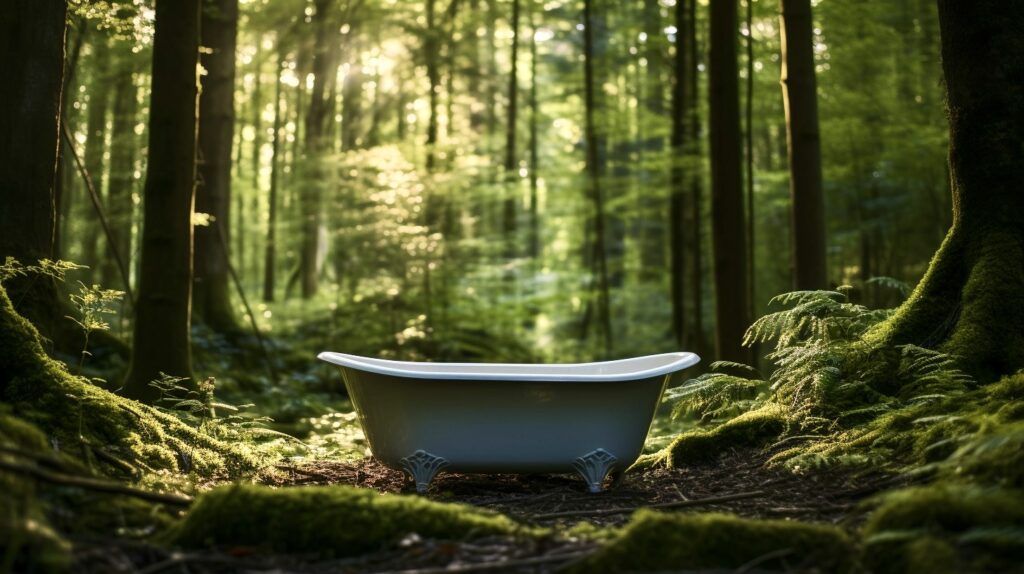Why Bother with Hygiene in the Great Outdoors?
The Benefits of Maintaining Personal Hygiene in Nature
Proper cleanliness helps prevent common outdoor ailments such as rashes and skin infections that can put a damper on your camping spirit. By washing away dirt and sweat regularly, you reduce the chances of these problems ruining your adventure.
Staying clean boosts morale and overall enjoyment during your camping trip. Feeling fresh not only improves self-confidence but also enhances your sense of connection with nature.
When you’re squeaky clean amongst the towering trees or beside a bubbling brook, it deepens the appreciation for both pristine wilderness and that refreshing shower waiting for you back home. (but certainly not least), practicing good hygiene practices in nature demonstrates respect for both ecosystems and fellow campers.
Proper waste disposal and cleaning habits ensure that you leave minimal impact on the environment for future generations to enjoy.
Choosing Appropriate Camping Gear
A suitable tent is vital for keeping you comfortable and well-ventilated. Look for a tent with mesh windows or vents that allow fresh air to circulate inside while keeping bugs out.
This will prevent condensation buildup, which can lead to a damp and unpleasant sleeping environment. Investing in a high-quality sleeping bag and camping mat is also crucial for your cleanliness and overall comfort.
Packing Essential Hygiene Supplies
To maintain personal hygiene while camping, it’s important to pack essential hygiene supplies that cater to your cleanliness needs without harming the environment around you. Choose biodegradable soap, shampoo, and toothpaste formulated specifically for outdoor use.
Hand sanitizer comes in handy when access to water is limited or unavailable. Wet wipes are great for freshening up throughout the day or quickly wiping away dirt from your hands before meals.
And let’s not forget about toilet paper – an absolute must-have! Pack enough rolls so you won’t find yourself stranded in nature without this indispensable necessity.
Selecting an Ideal Campsite Location
When it comes to staying clean while camping, choosing the right campsite location is crucial. Opt for an area that is away from water sources to prevent any contamination.
While it may be tempting to set up camp near a picturesque river or lake, remember that personal hygiene and maintaining a clean environment go hand in hand. By camping away from water sources, you reduce the risk of polluting them with soap and waste.
Additionally, avoid spots with excessive dirt or debris as they can make cleanliness more challenging. Look for a flat area with good drainage to prevent rainwater or any accidental spills from pooling around your campsite.
Establishing a Designated Cooking and Cleaning Area
To ensure cleanliness while camping, it’s essential to establish a designated cooking and cleaning area within your campsite. This helps keep food preparation separate from other activities and prevents cross-contamination. Always use separate containers for food preparation and waste disposal.
Using sealed containers will not only keep your food fresh but also prevent any unwanted critters from sniffing around your supplies.
To make cleaning convenient, consider setting up a portable sink or water station that provides easy access to clean water.
This can be achieved by using collapsible basins or even repurposing large plastic containers fitted with taps for washing hands, dishes, and utensils. Remember, the key is organization – keeping things separated will help you maintain cleanliness throughout your camping trip!

Personal Hygiene Practices in the Outdoors
Cleaning your body effectively without running water
When you’re out in the great outdoors, staying clean can be a challenge, especially when there’s no running water available. However, fear not!
There are alternative methods to keep your body fresh and odor-free even without a luxurious shower. One option is to embrace the magic of dry shampoo.
This handy product comes in powder or spray form and works wonders by absorbing excess oil from your scalp and hair, leaving it looking and feeling clean. Simply apply it to your roots, massage it in, and then brush or shake it out.
Another option is cornstarch, which can be used similarly as a dry shampoo substitute. Just sprinkle some on your scalp and rub it in with your fingers before brushing away the excess.
Wiping down with damp washcloths or using no-rinse body wipes
In addition to keeping your hair fresh, it’s important to wipe away dirt and sweat from the rest of your body as well. A simple solution is using damp washcloths. Before leaving for your camping trip, dampen several washcloths with water or a mild cleansing spray like diluted biodegradable soap.
Store them in resealable plastic bags for easy access when needed. Use these cloths to wipe down areas prone to sweating such as armpits, neck, and groin regions.
Alternatively, you can also opt for no-rinse body wipes specially designed for outdoor enthusiasts. These pre-moistened wipes are soaked in cleansing agents that leave you feeling refreshed without the need for additional rinsing or water usage.
Maintaining oral hygiene while camping
Taking care of our pearly whites is just as essential while camping as it is at home. To minimize water usage when brushing teeth outdoors, consider using toothpaste tablets or baking soda. Toothpaste tablets are small, dry pellets that you simply pop into your mouth, chew, and then brush your teeth as usual with a wet toothbrush.
Baking soda can also be a great alternative as it effectively cleans and freshens breath. Just dampen your toothbrush and dip it into the baking soda before brushing.
Carry dental floss or interdental brushes in your camping hygiene kit for a thorough cleaning regime. These compact tools can easily fit into any bag or pocket and will help keep your smile shining even in the wild.
Although camping takes us away from our everyday conveniences, it doesn’t mean compromising on personal hygiene. With these tips in mind, you can stay clean and fresh while enjoying the wonders of nature!
Managing Waste Properly
Mindful Disposal: Leave No Trace Principles
When it comes to waste management while camping, embracing the Leave No Trace principles is essential. These guidelines ensure that we minimize our impact on the environment and leave nature as untouched as possible. One of the key aspects of Leave No Trace is packing out all trash.
This means bringing along sturdy garbage bags and diligently collecting every bit of waste generated during your camping expedition. Remember, even small items like food wrappers or plastic bottles can harm wildlife and disrupt ecosystems if left behind.
Dispose Responsibly
Proper disposal is equally crucial in ensuring a clean camping experience for everyone. Firstly, store your packed-out trash securely in a designated container or dry bag to prevent leaks or odors during transportation.
Once you reach a suitable waste disposal facility, dispose of the trash responsibly according to local regulations. Be mindful not to dump any waste into water sources or bury it inappropriately, as this could harm the environment and pose health risks.
Conclusion
Embracing cleanliness while camping not only enhances our personal well-being but also fosters environmental stewardship. By preparing adequately with appropriate gear, practicing good personal hygiene, and managing waste responsibly through adherence to Leave No Trace principles, we can ensure an enjoyable and sustainable outdoor experience for ourselves and future generations of campers. So go ahead—venture into the wilderness with confidence!
